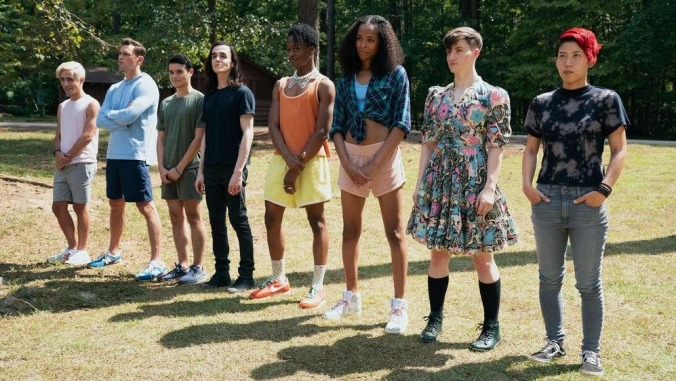They/Them wrestles with its own queer horror identity crisis
Writer-director John Logan (Skyfall, Gladiator) portrays conversion therapy as appropriately horrific, but doesn't deliver on transformative cinematic thrills
Film Reviews Queer
Queerness is so enmeshed in the cinematic roots of horror that the two are virtually inseparable, but it’s only recently that the connection has been explored more explicitly in its characters and stories, after being submerged metaphorically or thematically in the vestiges of a bigoted, repressive past. In that sense, a film like They/Them is an inevitability, reframing queer life in America through cinematic tropes of horror that provided a refuge for many in that particular community. The moments when it succeeds at commenting on continuing anti-LGBT travesties feel like a landmark of queer cinema, proudly planting a pride flag in the horror genre’s fertile fields. Unfortunately, They/Them’s biggest stumbles come from a crisis of identity—not in its characters or queer themes, but in the genre conventions it employs, misunderstanding the opportunities its storytelling affords.
Written and directed by John Logan, They/Them—pronounced “They Slash Them,” get it?—highlights a week at a conversion therapy camp, headed by the charming but enigmatic Owen Whistler (Kevin Bacon). After an introductory monologue shockingly devoid of Bible-thumping hate speech, his division of campers into boys’ and girls’ cabins introduces us to Jordan (Theo Germaine), a non-binary trans person whose pronouns are they/them. Surprisingly, Whistler is understanding of Theo’s transition and requests that they bunk with the boys in the spirit of the camp’s ethos of communal growth. However, as the week progresses, Jordan and the other campers note that something feels off about this place as the camp attempts to live up to its faux-therapeutic reputation.
This overriding sense of wrongness is ultimately where They/Them most excels, creating a sense of dread as the initially inviting and apparently transparent operation invites campers to embrace a more “gender normative” lifestyle. This unease comes across in ways that are patently obvious, like when trans woman Alexandra (Quei Tann) is forced to bunk with the boys after her supposed “deception” about her gender. But the camp is much more insidious in how it draws upon and exploits feelings of adolescent shame.
A persistent refrain in interactions between counselors and campers is that misguided teenage angst drives these young adults toward a gay “lifestyle,” exemplified by characters like Kim (Anna Lore), a straight-passing young woman whose desire for normalcy is trumped by her attraction to women; Veronica (Monique Kim), a proclaimed self-hating bisexual; or Stu (Cooper Koch), an athlete who sees his attraction to men as a hindrance to his chances as a varsity competitor. Of course, there are those in the group who have been forced to attend at the whims of parents wielding rewards or ultimatums, like the fabulous Toby (Austin Crute), but there’s an underlying sense that these folks are attending the camp primarily because of an absence of love and acceptance from their families and communities.
This feeds into an escalating tension that lends the film a gradually more oppressive atmosphere. As the camp counselors start to show their true colors, They/Them delves into a particularly prescient point about conversion therapy camps as self-perpetuating monster factories, where that exploited shame is transformed into a destructive force. The portrayal of a therapy session between Jordan and camp co-owner Mrs. Whistler (Carrie Preston) is a particularly potent exploration of this point, unsettling in its quiet intensity and foreshadowing the eventual horrors that this kind of encouraged self-hatred can foster.
If this doesn’t sound much like a slasher flick, though, it’s because the film has a strained relationship with its central conceit. Yes, there is a slasher figure lurking around the periphery of the narrative, though their presence is fairly restrained and almost ephemeral, as if the film has been edited this way solely to intermittently remind you of its punning title. In fact, the film doesn’t truly become a slasher until the final 15 minutes or so, and even then the lackluster explosions of violence leave minimal visceral impact as the story hurtles towards its forced finale, especially in contrast with the established emotional manipulation of the preceding two acts.
The flimsiness of the ending also further highlights the misplaced priorities of Logan’s screenplay, which not only fails to fully establish what motivates the camp’s conversion if not overt religiosity, but spends a lot of time establishing and getting to know its queer campers, only for them to be inconsequential to the actual resolution of the plot. Jordan is a compelling embodiment of their collective defiance against the monstrosity of the camp’s “therapy,” but the rest of the younger members of the ensemble mainly serve as recipients for abuse, even if that admittedly makes for some compelling moments of torturous horror. Logan’s attempts to humanize these kids are laudable, as queer folks deserve to be seen as more than just victims of society, but the balance between empathetic portrayal and horrific payoff is skewed so heavily toward the former that the latter seems to belong to a different film entirely.
They/Them gets points for atmosphere and theme, but it’s ultimately too uneven to stand as either a coherent condemnation of the actual tortures of conversion therapy or as a cathartic release through the power of horror tropes. It’s a misfire, but still a nominally compelling one so long as one is prepared for that titular slash to cut through the established mood, so that the film deflates like a half-filled balloon.